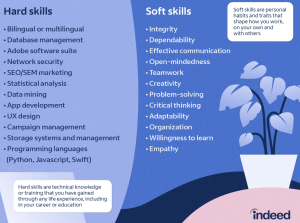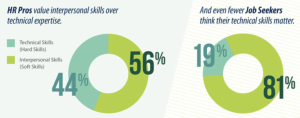The movement to tear the paper ceiling (that is, see people for the wider skills they have rather than one written on a piece of paper) is growing.
Businesses and governmental organizations alike are now coming to the conclusion that a college degree is an arbitrary requirement; and not only that, one that actually prevents/discourages many skilled applicants from competing for positions in which they could excel.
We’re seeing this play out in legislation that will soon require the civil service to transition skills-based hiring – and it’s a shift that is long overdue.
But as hiring managers move to implement skills-based hiring, they must first answer one fundamental question, “Which skills should we prioritize?”
Broadly speaking, skills can be divided into two categories:
There are those that are technical and knowledge-based, which are sometimes called “hard skills”.
Then there are those with more enduring characteristics, often known as foundational or “soft skills”.

SOURCE: Indeed

The transitory nature of technical skills
Hard skills can usually be taught in a straightforward manner and are easier to learn than foundational or soft skills.
They are often demonstrated through certifications, such as AWS certifications or the various colored “belts” for Six Sigma.
Unfortunately however, technical skills may not remain relevant forever. Some, like technology skills, change so rapidly and that they require regular retooling to remain current.
A Gartner study of how skills requirements on job postings changed from 2017 to 2021 is a great illustration of this phenomenon.
The firm found that “the total number of skills required for a single job has been increasing by 10% year-over-year since 2017.
Furthermore, one in three skills in an average 2017 job posting in IT, finance or sales are already obsolete.” It’s a rare job posting that requires Fortran programming skills.
Prioritizing enduring characteristics
Enduring characteristics, on the other hand, such as critical thinking, interpersonal savvy and strategic thinking are more difficult if not impossible to train.
One cannot easily teach potential air traffic controllers the spatial skills that are required to intuitively understand how the relative positions, speeds and trajectories of aircraft will interact.
Without this innate characteristic, however, an air traffic controller will have a very hard time performing under pressure and preventing planes from colliding.
Nevertheless, these are important skills for HR to prioritize – the enduring characteristics that enable employees learn new technologies and skills they will need to succeed as conditions change.
Don’t focus on ‘hard’ skills
Focusing on skills that are typically learned on the job within 6-9 months is counterproductive, especially since, as Gartner shows, many of the required skills are likely to change in the next few years anyway.
What’s more, legal and professional standards discourage denying work opportunities to people based on lacking skills that they typically learn after a short time on the job.
So, hiring needs to focus on assessing critical skills that are most predictive of performance and are required on Day 1 of a job rather than learned shortly after job entry.
The specific set of skills depends on the job requirements, but important enduring characteristics that are often the focus of hiring include things like communication, writing, reasoning, conscientiousness, and initiative.
If the position involves working in a fast-paced, rapidly changing environment, agility and resilience may also be critical for job success.
If the job requires dealing with the public and working closely with team members to solve problems together, communication, conscientiousness, and collaboration will be high on the list too.
This doesn’t mean that technical and knowledge-based skills are unimportant.
Cloud administrators need expertise working with the specific cloud technologies that the organization employs. These types of hard skills are often demonstrated through certification or credentialing. If the job is for a Microsoft Azure administrator, certification from Microsoft should be sufficient. A bank teller, on the other hand, should be able to learn the knowledge and banking skills they need in a few weeks of training.
Assessing critical skills effectively and efficiently
Organizations need high-quality assessments to determine whether a candidate has the critical skills to be successful in the job and organizational context.
A variety of different assessment types may be used, ranging from resume screening to work samples to structured job interviews, depending on the skills to be assessed and what type of candidate experience the organization wants to provide.
But it’s important not to go overboard with assessments. It’s far better to winnow down the list of skills that are formally assessed to those that are most critical for success on the job.
Assessing every skill that may be used on a job would be too burdensome in terms of the time it would take for candidates to complete the assessments and the costs of such whole person assessments for organizations.
Hiring on the basis of skills that candidates need to succeed on the job, rather than arbitrary degree requirements, will strengthen organizations.
This is best accomplished by using an optimal set of skill assessments that efficiently and effectively predicts job performance, while also providing a positive hiring experience for candidates.
This will enable organizations to attract and build a solid employee base that’s not just prepared to succeed today but will also be able to adapt to meet the challenges of the future.
